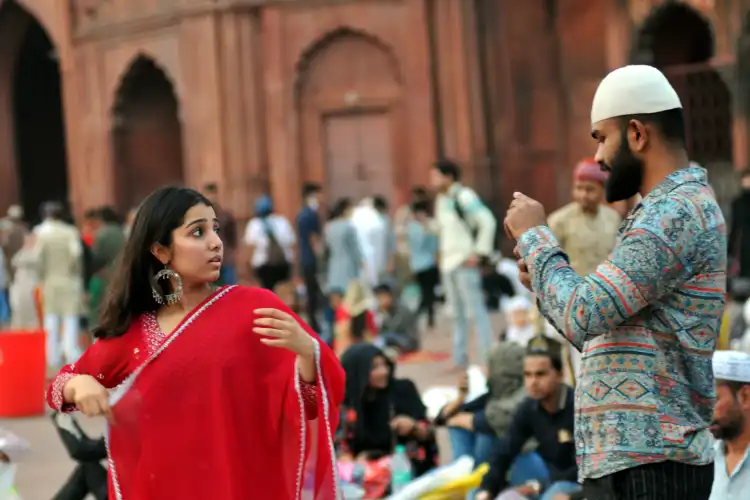
Eman Sakina
“And those who hurt Muslim men and women, without them doing anything (wrong), have burdened themselves with false accusations and open sin.” The general meaning of this Quranic verse is that those who hurt a Muslim without any Shar’i reason, burden themselves with false accusations and open sin, deserve to be given punishment.
Friday Musings
A real Islamic society is one in which people look after and care for each other, help each other in times of trouble, avoid causing harm to anyone, and maintain a mutual relationship based on sociability, good manners, and well-wishing. Islam teaches these things, promoting feelings of tolerance, affection, compassion, and sympathy in society and preventing those things which are harmful to society such as unreasonable strictness and hurting others. Living your life with good mutual relations and reconciliation is one of the aims of Islam. It is also obvious that one cannot have a good relationship with others by violating their rights and hurting their feelings. The above Ayah contains an important principle in this regard. The core of Islamic teachings is that “One should not hurt others without any [Shar’i] reason’’.
A blessed Hadees states: ‘Protect people from your mischief [i.e., do not cause mischief to people]. This is a Sadaqah that you will do for your own Nafs.’ Another narration states that the Greatest Prophet Mohammad(PBUH) asked his companions, ‘Do you know who a Muslim is?’ They replied Allah and His Prophet know the best.’ He said, ‘A Muslim is the one from whose tongue and hand, (other) Muslims remain safe.’
A famous Taabi’i commentator Sayyiduna Mujahid said: Those in Hell will be afflicted with itch. They will scratch their bodies till the bone of one of them will be exposed (due to skin and flesh coming off). It will be called out to him, ‘O so-and-so! Do you feel pain due to it?’ He will reply, ‘Yes.’ The one calling out will say, ‘You used to hurt Muslims. This is your punishment for that.’
The Ayat and hadees have made this ruling quite clear like a bright day that hurting others is a heinous crime and a major sin. But the way this excellent ruling of Islam has been cast aside in our society is shameful and regretful. For instance, during wedding ceremonies, parties are arranged, causing noises throughout the night. Music is played with the volume turned up throughout the night and the firework is lit, greatly distressing, and disturbing the neighbours, patients, old people, children and those who have to go to work in the early morning.
On the occasions of Eid, Independence Day, and New Year’s Night, silencers are removed from motorcycles, making noises, and causing trouble to people. Playing cricket, football, etc., in streets and neighbourhoods, especially throughout the nights of Ramadan, making noises and causing trouble is common.
In everyday life, parking vehicles in no-parking areas, throwing debris, garbage, and filth at improper places, and hurting others have become the order of the day. Blocking the path on very busy streets for various religious and non-religious programmes, and causing inconvenience to others seem to have become an essential part of life.
Causing trouble to neighbors is perhaps not even considered something bad. Some neighbours get annoyed when you say to them, ‘Please do not cause trouble for us.’ Even fairly religious people are careless about the rights of neighbours.
So, what can be said about those who are far away from religion? Talking loudly in homes, watching television with the volume turned up, gathering together in front of someone’s home and making noises at midnight, dragging household furniture and other things at late night, which causes noise, using noise-making instruments such as an electric or hand drill, disturbing the sleeping ones by grinding spices using a grinder at midnight are all quite common. Nowadays, it seems there is no limit to the harm one causes to his neighbours.
How important the fulfilment of the rights of neighbours is, can be realized by having a look at the following Hadees. "The Beloved Prophet once said to his companions, ‘By Almighty! That person is not Mu`min. By Almighty! That person is not Mu`min. By Almighty! That person is not Mu`min.’ Blessed companions asked, ‘YaRasoolallah Who?’ He said, ‘The one whose neighbours are not safe from the harms he causes.’ (That is, the person who causes trouble to his neighbours.)
Are we Mu`min? Ponder! O, Allah! Bless our hearts with mercy so that we do not hurt others.
ALSO READ: An Islamic court that helps women get divorce decree in a day
“Whoever causes hardship [to others]” for no just cause, “Allah will cause hardship to him” as a requital for what he did. Allah has forbidden people to harm others and cause hardship to others; rather He has enjoined upon them the opposite of that. Therefore, the best of people are those who are best to others, and the most beloved of people to Allah are those who bring the most benefit to His slaves.
